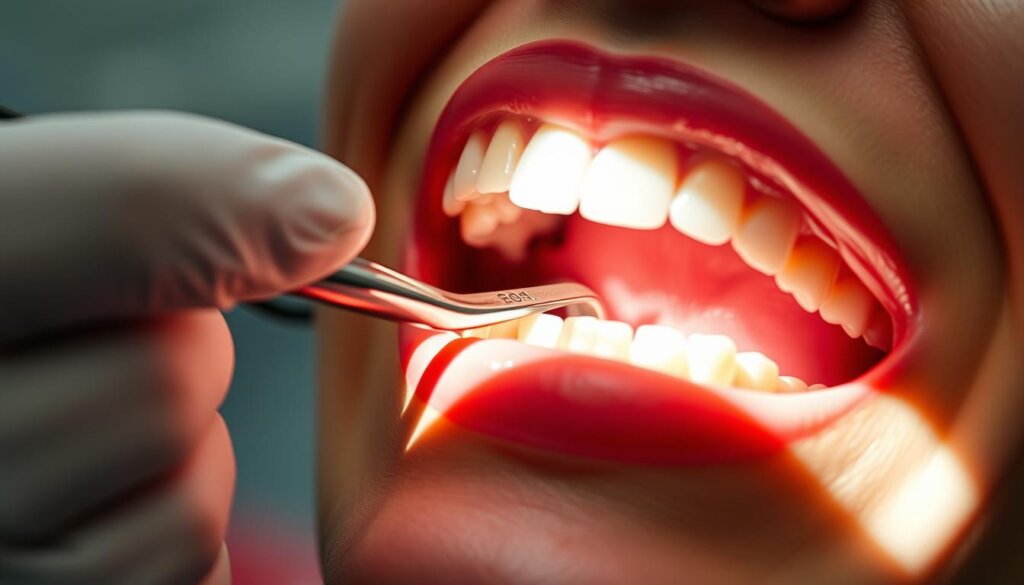Why Do My Gums Bleed During Teeth Cleanings?
Did you know up to 75% of Americans might face gum disease in their lives? This large number points to a major health issue that’s often spotted during dental check-ins. When gums bleed, it could mean minor problems like gingivitis or even bigger health risks. It’s key to know why this happens to keep both our gums and overall health in good shape.
Going to the dentist might make some people worry about their gum health, especially if there’s bleeding. Bleeding gums are pretty common, but if it keeps happening, it could mean there’s a deeper problem. Dentists look into many things, like how well you clean your teeth, if you have other health issues like diabetes, changes in hormones, or not getting enough vitamins.
If you’re worried about bleeding when getting your teeth cleaned, know it’s not supposed to happen. Telling your dentist lets you start fixing the issue, helping protect your gums from major dental problems.
Key Takeaways
- Gum bleeding during a dental checkup can be a red flag for gingivitis or more severe gum diseases.
- A multitude of factors, including teeth grinding and vitamin deficiencies, may be responsible for bleeding gums.
- It is imperative for patients to communicate gum bleeding to their dentist or primary healthcare provider.
- Early detection and treatment are crucial in preventing the progression of gum diseases.
- Maintaining gum health is an integral part of one’s overall health and well-being.
Understanding Gum Bleeding: An Overview
Maintaining oral hygiene is key for good health, and this is extra important for gum health. Healthy gums are the foundation of our dental wellness. It’s crucial to know what healthy gums look like and the signs of gum disease. This way, any problems can be caught and dealt with early.
What Constitutes Healthy Gums?
Healthy gums are firm and usually pink, though some people’s gums have different colors. They fit snugly around teeth, with no swelling or pulling away. Keeping up with oral hygiene, like brushing and flossing daily, is vital for strong and healthy gums.
Common Signs of Gum Issues
Spotting early signs of gum problems can save you from long-term damage. Some early warnings include:
- Persistent bad breath that brushing doesn’t help
- Gums that are red, puffy, or sore
- Bleeding while brushing or flossing, which shows something’s wrong with your gums
- Receding gums that make your teeth look longer
Seeing these symptoms means it’s time to see a doctor. Catching and treating gum issues early can help heal your gum health and keep bigger problems at bay.
Causes of Gum Bleeding
Gum bleeding can happen for many reasons. From your daily activities to health problems. Knowing why it happens helps in preventing and treating it.
Harsh Brushing Techniques
If your gums are tender, brushing too hard can hurt them. Using a stiff toothbrush or too much pressure can damage your gums. This can make sensitivity worse and cause other gum problems.
Plaque Buildup and Tartar
Plaque buildup is a major cause of gum bleeding. This sticky bacteria film turns into tartar if not cleaned well, especially near your gums. This can lead to gum swelling called gingivitis. If plaque and tartar keep building up, your gums might bleed when you brush or floss.
Medical Conditions Impacting Gum Health
Some health problems, like diabetes, can affect your gums. They can weaken your body’s defense against infections. This can make your gums more likely to get infected and bleed. Knowing these health problems is key to treating them right.
The Role of Dental Cleanings
Dental cleaning does more than keep your smile shiny. It’s key in fighting gingivitis. In places like Houston, good dental care is vital for oral health. Knowing what happens during cleanings and why you might bleed helps you take care of your mouth.
What Happens During a Dental Cleaning?
In Houston, dental cleanings are thorough. Hygienists remove plaque and tartar from your teeth. This isn’t just to prevent problems; it also helps if you’re starting to show signs of gingivitis. Special tools get rid of hard-to-remove deposits, making your gums and teeth healthier.
Why Cleanings Can Trigger Bleeding
Some people have sensitive gums or early gingivitis, so cleanings might make them bleed. This bleeding shows that the cleaning is removing bad plaque, which is good for your gum health. Even if it’s a bit uncomfortable, this process is important to stop gum disease from getting worse.
Getting regular dental cleanings is a good way to fight gingivitis. Clinics in Houston know how important these cleanings are to stop serious dental problems. Cleanings help you have better oral health and understand what your gums and teeth need.
Risk Factors for Bleeding Gums
Knowing why gums bleed is key for taking care of our teeth every day and when seeing the dentist. Important reasons include hormonal changes, smoking, and not taking care of our teeth well. All of these can affect the health of our gums in big ways.
Hormonal Changes
Hormonal shifts can make our gums more sensitive and likely to bleed. This is especially true for women during pregnancy or their menstrual cycle. The toxins from plaque hit harder during these times, causing more inflammation and making gums bleed easier.
Smoking and Tobacco Use
Smoking and using tobacco hurt our gums a lot. They damage gum tissues, make gum disease more likely, and harm how gum cells work. Because of this, smokers often see their gums bleed more and heal slower.
Poor Oral Hygiene Practices
Not taking care of our teeth is a big reason why gums bleed. Skipping brushing and flossing leads to plaque. This plaque turns into tartar, which makes gums even angrier. Keeping up with brushing and flossing stops gum disease and bleeding before they start.
- Hormonal changes: Monitor and manage during life stages such as pregnancy and menstruation.
- Smoking and tobacco use: Seek resources for cessation to improve overall oral health.
- Oral hygiene: Uphold rigorous brushing and flossing routines to maintain gum integrity.
Being aware of these risks and changing our habits can really help avoid bleeding gums. Taking these steps makes for a healthier mouth and a happier you.
Signs You Shouldn’t Ignore
To keep your oral health in check, be aware of important warning signs. Some signs mean you should get help to stop bigger problems.
Persistent bleeding is a serious sign. If your gums bleed a lot after you brush or floss, this could mean a bigger health issue. It’s not just bad for your teeth but might signal other health concerns.
Seeing a gum color change is also worrying. Gums should be pink. Reds or pale colors could mean you have an infection or inflammation.
Having bad breath that sticks around can suggest gum disease. If your mouth tastes bad too, this might harm your social life and how you feel about yourself.
- Persistent Bleeding
- Changes in Gum Color or Size
- Bad Breath and Foul Taste
If you see any of these symptoms, see a dentist soon. They can figure out the problem and fix your oral health. If you wait, things could get worse. You might need serious treatments or face lasting harm.
Home Care Tips to Prevent Bleeding
To keep your gums healthy and avoid gum problems, it’s important to follow some home care steps. Knowing and practicing the right way to brush, flossing regularly, and using mouthwash wisely are key. These steps prevent gum bleeding.
- Proper Brushing TechniquesUsing the correct way to brush is key to not harming your gums. Brush with a soft-bristled toothbrush and be gentle on the gums. Use short, circular motions to clean every tooth surface well. Make sure the brush gets into the spaces along the gum line where plaque likes to hide.
- Importance of FlossingFlossing every day helps get rid of food and plaque that your toothbrush can’t reach. This is important between the teeth. When flossing, gently move the floss up and down between your teeth. Avoid snapping it into your gums to keep them healthy and strong.
- Using Mouthwash EffectivelyAdding mouthwash to your dental care routine is a good idea to help stop gum bleeding. It works by reducing plaque and killing harmful bacteria. Choose a mouthwash that’s made to strengthen gum health and fight gum disease.
Professional Treatment Options
Sometimes, home methods don’t fully stop gum bleeding. That’s when you should consider professional help. Treatments like deep cleaning, periodontal maintenance, and medications for gums are key. They help manage and might even solve gum inflammation and disease.
Deep cleaning means scaling and root planing by experts. It’s about taking off plaque and tartar from under your gums. Normal brushing and flossing can’t reach these spots. This type of cleaning stops gum disease from getting worse. It also helps prevent more gum recession and bone loss.
After deep cleaning, keeping up with periodontal maintenance matters a lot. It involves going back to the dentist regularly for gum health checks. These visits can catch early signs of gum disease. This way, you can tackle it right away.
Along with these treatments, there are medications for gums. They vary from topical solutions to anti-inflammatory medicines. They aim to lessen gum swelling and fight infection. The kind of medication you get depends on your specific situation and gum condition.
| Treatment Option | Description | Benefits |
|---|---|---|
| Deep Cleaning (Scaling and Root Planing) | Comprehensive cleaning below the gum line | Removes plaque and tartar, reduces bacteria |
| Periodontal Maintenance | Regular dental visits post-treatment | Monitors and maintains gum health |
| Medications for Gums | Usually anti-inflammatory or antibiotic | Controls infection, reduces inflammation |
Going for these professional options can really boost your gum health. They provide specific care that attacks gum disease from its root causes. This approach is not just on the surface. It’s deep and thorough.
When to See a Dentist
Knowing when to see a dentist is key for great oral health. Regular dental checkups are a big part of keeping your mouth healthy. Spotting signs that you need urgent dental care can stop emergencies.
It’s usually recommended to visit your dentist twice a year, but some people might need to go more often. How often you go depends on your own dental health. These visits help catch problems like tooth decay and gum disease early.
If you notice certain serious signs, you should see your dentist right away. These signs include:
- Severe pain that messes with your daily life
- Significant or ongoing bleeding
- Sudden swelling in your mouth or face
- Teeth that are loose or have fallen out
Below is a table that shows when to go for checkups and when urgent care is needed:
| Reason for Visit | Regular Checkup | Urgent Care |
|---|---|---|
| Frequency | Every 6 months | As needed based on symptoms |
| Common Concerns | Plaque, decay, general cleaning | Bleeding, pain, trauma |
| Preventative Focus | Yes, primarily | No, symptom resolution focus |
Following advice on how often to get dental checkups and knowing when to seek urgent dental care is vital. Whether for a regular checkup or an emergency visit, taking care of your dental health is important for your overall health.
The Connection Between Overall Health and Gums
Your gums tell a lot about your total health, not just your oral health. Research shows strong links between diseases like diabetes and heart conditions and gum health. It’s important to know these links to take care of both your oral and overall health.
People with diabetes have a higher chance of getting gum disease. This is because diabetes makes it hard for the body to fight off infections. High blood sugar in diabetics also increases the risk of gum disease. This creates a cycle that affects managing diabetes and oral health.
Heart health and gum health are closely connected too. Studies have found that gum diseases can increase the risk of heart disease. This might happen because bacteria from your gums can get into your blood. This can cause inflammation in your arteries and lead to heart problems.
So, keeping your mouth healthy is key to keeping your whole body healthy. Make sure to go to the dentist regularly, take good care of your teeth, and get help for conditions like diabetes and heart disease. By knowing how your gums affect your overall health, you can take steps to keep both in good shape.
Nutrition’s Impact on Gum Health
The food you eat greatly affects your gums’ health. Learning about nutrition, vitamins for gums, and foods to avoid can help you keep your gums healthy by choice.
Vitamins and Minerals Beneficial for Gums
- Vitamin C: It’s crucial for making collagen, which keeps your gums strong.
- Calcium: This mineral doesn’t just make bones strong; it also helps your teeth and gums.
- Vitamin D: By helping your body absorb calcium, it indirectly supports gum health.
Foods to Avoid for Healthier Gums
- Sugary Foods: Eating a lot of sugar can cause bacteria to grow and gum disease to start.
- Acidic Foods and Beverages: These can wear down tooth enamel, putting your gums at risk.
- Starchy Foods: Foods like bread, chips, and pasta can stick in your teeth and cause bacteria.
Eating foods full of good vitamins and minerals, and avoiding bad ones, helps your gums stay healthy. This method fights gum diseases and boosts your entire mouth’s health.
The Importance of Regular Dental Check-Ups
Keeping your mouth healthy greatly relies on regular dental checkups. These visits are more than cleanings. They’re key for preventing health problems before they get serious. Knowing how these check-ups work and how they help can make you see them as important health moments, not just chores.
At a standard check-up, you’ll get a full exam. This includes getting rid of tartar and plaque, polishing your teeth, and maybe getting X-rays. These steps keep your teeth and gums clean. They also help find any early signs of tooth decay, gum disease, or other issues.
Visiting your dentist regularly is also a chance to make your dentist-patient relationship stronger. You get care that fits your own dental history and needs. A good relationship with your dentist means you can talk openly about your concerns. Together, you can work on preventing problems in a way that fits you best.
- Professional Cleanings: These get off plaque and tartar that brushing and flossing at home can’t.
- Detailed Examinations: These look for signs of decay, gum disease, and other mouth problems.
- Personalized Advice: You get tips on eating, oral care, and how to prevent issues based on your health.
So, the value of regular dental checkups is huge. They protect you from mouth diseases and are key for your overall health. Staying committed to these check-ups and building a strong dentist-patient relationship means you’re looking after your health in the best way.
Myths About Gum Bleeding
Debunking gum bleeding myths and the misconceptions about bleeding gums is key. We need to understand them for proper gum health care. Let’s use modern dental science to check these myths.
Common Misconceptions Debunked
- Myth: “Bleeding gums are always a sign of brushing too hard.”
- Fact: Aggressive brushing can make gums bleed. But, often, bleeding gums point to bigger issues like gingivitis or periodontal disease.
- Myth: “Bleeding gums are not that serious and can be ignored.”
- Fact: Ignoring bleeding gums is a bad idea. They can lead to worse oral health problems. Catching and treating them early can stop more severe diseases and tooth loss.
- Myth: “If my gums bleed, I should stop flossing.”
- Fact: You might see some bleeding when you floss. But, stopping flossing allows plaque to build up, making gum issues worse. Use gentle flossing methods instead.
Understanding the Real Risks
Ignoring bleeding gums can cause big dental and general health problems. Issues like chronic gum disease are linked with heart disease, diabetes, and breathing problems. So, beyond just debunking myths, smart oral care is crucial for keeping your whole body healthy.
| Common Belief | Reality | Impact on Health |
|---|---|---|
| Bleeding gums after brushing | May indicate gum disease | Potential for serious gum and health issues |
| Only poor oral hygiene causes bleeding | Genetics and other factors also play a role | Comprehensive dental care needed |
| Improves without professional care | Professional assessment often necessary | Prevents progression of disease |
Long-Term Consequences of Ignoring Bleeding Gums
Not paying attention to bleeding gums is a big mistake. It can lead to serious health problems that affect more than just your mouth. The long-term consequences of bleeding gums can impact the health of your teeth, gums, and your overall well-being.
Ignoring bleeding gums can make you more likely to get periodontal diseases. These diseases are connected to other health problems that can seriously affect your body.
Potential for Gum Disease
If your gums keep bleeding, you might be on the path to getting gum disease, or periodontitis. This serious infection harms the soft tissue. Without treatment, it can break down the bone that supports your teeth. It might make your teeth loose or even cause tooth loss.
Impact on Overall Well-Being
| Condition | Correlation to Gum Disease |
|---|---|
| Cardiovascular Disease | Increased risk due to inflammation caused by periodontitis |
| Diabetes | Periodontitis may worsen blood sugar control |
| Respiratory Disease | Bacteria from infected gums may be inhaled or spread to the lungs |
The overall well-being of a person can be hurt by the effects of untreated gum diseases. It’s very important to take care of gum bleeding quickly. This will help avoid these long-term consequences.
Educating Yourself on Gum Health
Learning about gum health education is key for keeping your mouth healthy and disease-free. Today, there are many dental care resources available. They help people learn and adopt healthier dental habits.
If you want to know more about gum care, there’s plenty of information out there. From basic tips to advanced care techniques, you can find resources to help. This makes it easy to take charge of your dental health.
Resources for Understanding Gum Care
- Comprehensive online portals that offer articles, tutorials, and interactive guides on gum care
- Booklets and pamphlets provided by dental offices, detailing preventive measures and treatment options
- Workshops and seminars that address gum health as part of overall dental wellness
Staying Updated with Dental Research
Staying informed about the latest dental research is crucial. It ensures you’re following the most up-to-date and effective practices. Here’s how to stay in the know:
- Subscribing to dental journals and online publications that report on the newest findings and innovations in gum health
- Participating in community health forums and discussions with professionals who specialize in dental care
- Attending annual dental conferences and symposiums which focus on the latest treatments and discoveries in dental science
By using these dental care resources and staying current with research, you can actively improve your gum health. This greatly benefits your overall well-being.
Conclusion: Taking Control of Your Gum Health
Maintaining strong oral health is crucial, and focusing on your gums is key. Understanding the risks, spotting early signs, and regular care can stop gum disease.
Emphasizing Preventative Care
Preventative care is crucial to stop gum issues before they get worse. This means going to the dentist often, getting teeth cleaned properly, and keeping any health issues in check. Catching and treating problems early can help avoid serious gum disease.
Commitment to Regular Dental Hygiene Practices
Taking care of your gums starts with being dedicated to your dental hygiene. This means brushing and flossing well, and using mouthwash to fight plaque and germs. Sticking to these habits helps protect your gums and keeps you healthy overall, showing how your oral hygiene affects your whole body.





